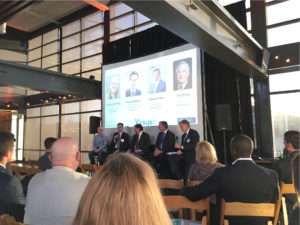 With beautiful weather and the Nashville skyline as our backdrop, top minds in healthcare gathered last week for our 3rd Annual Nashville Healthcare Technology Forum. We explored some of the healthcare technology strategies that will guide the future of the industry, and we picked up valuable insights from two thought-provoking keynote speakers and a panel of healthcare executives. Here are some highlights.
With beautiful weather and the Nashville skyline as our backdrop, top minds in healthcare gathered last week for our 3rd Annual Nashville Healthcare Technology Forum. We explored some of the healthcare technology strategies that will guide the future of the industry, and we picked up valuable insights from two thought-provoking keynote speakers and a panel of healthcare executives. Here are some highlights.
“An engaged patient is most likely to be a healthy patient.” – Nadeem Ahmed, Sr. AVP, Salesforce
Our first keynote speaker, Nadeem Ahmed, Salesforce’s Senior Area Vice President, Healthcare & Life Sciences, kicked off the program with an inside look at Salesforce’s innovative efforts to leverage integrated cloud technology to improve patient outcomes. As Virsys12’s CEO Tammy Hawes noted in her introduction, Ahmed has been instrumental in helping Salesforce come up with a go-to-market strategy around healthcare.
Ahmed said that through the Health Cloud platform, Salesforce’s goal is to eliminate silos—one of the biggest barriers both to increased efficiencies and better outcomes—and unify care around the patient. This means not just coordinating care inside and outside the clinical environment but also taking healthcare IT integration a step further by including essential community services, such as Uber for transportation. Because patients can access this all-encompassing “patient success platform” from their device of choice, Health Cloud is making it easier for them to stay engaged in their wellness—a theme that came up during several of the afternoon’s presentations.
Sharing examples from clients like Easter Seals, Athena Health, Lilly and others, Ahmed’s presentation showed us how diverse healthcare organizations are leveraging integrated cloud technology to track the patient journey from sickness to managed care to improved outcomes. And that’s just the beginning. The introduction of Salesforce’s “Einstein” Artificial Intelligence means Health Cloud is now social, mobile and intelligent.
“There’s nothing worse than having your highly skilled, highly motivated employees spending time on manual tasks that don’t use their skills.” – Scott Hulstrand, Manager, Quality and Data Integrity Team, Care Coordination Institute
Technology has been instrumental in the work Care Coordination Institute (CCI) has done to help transform Greenville Health System’s MyHealth First Network (MyHFN)—an integrated network of 11 hospitals and 2,200 providers across 11 counties—from a volume-based to value-based model. Our second keynote speaker, Scott Hultstrand, Manager of CCI’s Quality and Data Integrity Team, showed us how it’s made a difference in the lives of patients and contributed to $17 million in shared savings last year.
Hultstrand described how CCI partnered with Virsys12 to strengthen their healthcare technology strategy and accelerate technology into application for patient care. Time savings is just one area where Health Cloud and V12 ACO have made a huge impact at MyHFN. A critical process that used to take months to complete is now done in weeks. Another has dropped from three days to only 20 minutes.
While those metrics are pretty impressive, this comment Hultstrand shared from one of the employees may be even more powerful: “It’s just like clicking a button and it’s done.”
“We needed a single system that could easily integrate and create the most elegant analytics and dashboards you can think of—and also be able to communicate a lot of information through just a text message to an expectant mother who may not have a smartphone.” – Justin Lanning, CEO, 180 Health Partners
Virsys12’s Paul Peterson moderated the closing panel of healthcare executives who discussed how they are using Salesforce to transform the business side of healthcare. This year’s panelists were:
- Tim Riley, CIO, Network Health
- Justin Lanning, CEO, 180 Health Partners
- Rob Watkins, Staff Attorney, Tennessee Justice Center
- Steve Kress, CEO, Renova PCA
At 180 Health Partners, for example, Lanning says they didn’t want to distract from their primary purpose by having to focus on software development. Working with an established platform and experienced partners allowed them to connect with major health plans, keep costs low and accelerate time to market. Likewise, Kress says that Salesforce has given Renova the “best of both worlds” by allowing them to focus on what they do best while leveraging an existing platform to connect with numerous different EHRs.
Riley says getting the proper infrastructure and systems in place was critical for Network Health hospitals’ profitability and ability to service customers. Salesforce gives them the security, simplicity and flexibility they need to engage patients in their wellness and make adjustments in real time.
Meanwhile, Watkins told us that Tennessee Justice Center has used technology to translate their team’s deep knowledge of Medicaid’s legal complexities into plain language and an easy-to-follow questionnaire. Social workers and others now use this with patients to make sure no one falls through the cracks.
After hearing about the results from these healthcare IT integration efforts, one audience member asked a question that was likely on the minds of many attendees: “Where do you start?”
Riley recommending asking:
- Where are we most vulnerable? Where’s the highest risk?
- What’s the need/value to the business?
- Will this have a useful life of 18 months—and if not, are there other ways of addressing this problem besides automation?
The panelists each wrapped up by sharing some truly inspirational stories about the tangible impact their work is having on people’s lives. It was a fitting way to close, and it reinforced for us the fact that the patient is ultimately at the center of all we do.
Thanks to all who attended and to Salesforce, our speakers and panelists for being so generous with your insights. We look forward to discussing new innovations in healthcare at our next Forum!
 With beautiful weather and the Nashville skyline as our backdrop, top minds in healthcare gathered last week for our 3rd Annual Nashville Healthcare Technology Forum. We explored some of the healthcare technology strategies that will guide the future of the industry, and we picked up valuable insights from two thought-provoking keynote speakers and a panel of healthcare executives. Here are some highlights.
With beautiful weather and the Nashville skyline as our backdrop, top minds in healthcare gathered last week for our 3rd Annual Nashville Healthcare Technology Forum. We explored some of the healthcare technology strategies that will guide the future of the industry, and we picked up valuable insights from two thought-provoking keynote speakers and a panel of healthcare executives. Here are some highlights.
“An engaged patient is most likely to be a healthy patient.” – Nadeem Ahmed, Sr. AVP, Salesforce
Our first keynote speaker, Nadeem Ahmed, Salesforce’s Senior Area Vice President, Healthcare & Life Sciences, kicked off the program with an inside look at Salesforce’s innovative efforts to leverage integrated cloud technology to improve patient outcomes. As Virsys12’s CEO Tammy Hawes noted in her introduction, Ahmed has been instrumental in helping Salesforce come up with a go-to-market strategy around healthcare.
Ahmed said that through the Health Cloud platform, Salesforce’s goal is to eliminate silos—one of the biggest barriers both to increased efficiencies and better outcomes—and unify care around the patient. This means not just coordinating care inside and outside the clinical environment but also taking healthcare IT integration a step further by including essential community services, such as Uber for transportation. Because patients can access this all-encompassing “patient success platform” from their device of choice, Health Cloud is making it easier for them to stay engaged in their wellness—a theme that came up during several of the afternoon’s presentations.
Sharing examples from clients like Easter Seals, Athena Health, Lilly and others, Ahmed’s presentation showed us how diverse healthcare organizations are leveraging integrated cloud technology to track the patient journey from sickness to managed care to improved outcomes. And that’s just the beginning. The introduction of Salesforce’s “Einstein” Artificial Intelligence means Health Cloud is now social, mobile and intelligent.
“There’s nothing worse than having your highly skilled, highly motivated employees spending time on manual tasks that don’t use their skills.” – Scott Hulstrand, Manager, Quality and Data Integrity Team, Care Coordination Institute
Technology has been instrumental in the work Care Coordination Institute (CCI) has done to help transform Greenville Health System’s MyHealth First Network (MyHFN)—an integrated network of 11 hospitals and 2,200 providers across 11 counties—from a volume-based to value-based model. Our second keynote speaker, Scott Hultstrand, Manager of CCI’s Quality and Data Integrity Team, showed us how it’s made a difference in the lives of patients and contributed to $17 million in shared savings last year.
Hultstrand described how CCI partnered with Virsys12 to strengthen their healthcare technology strategy and accelerate technology into application for patient care. Time savings is just one area where Health Cloud and V12 ACO have made a huge impact at MyHFN. A critical process that used to take months to complete is now done in weeks. Another has dropped from three days to only 20 minutes.
While those metrics are pretty impressive, this comment Hultstrand shared from one of the employees may be even more powerful: “It’s just like clicking a button and it’s done.”
“We needed a single system that could easily integrate and create the most elegant analytics and dashboards you can think of—and also be able to communicate a lot of information through just a text message to an expectant mother who may not have a smartphone.” – Justin Lanning, CEO, 180 Health Partners
Virsys12’s Paul Peterson moderated the closing panel of healthcare executives who discussed how they are using Salesforce to transform the business side of healthcare. This year’s panelists were:
- Tim Riley, CIO, Network Health
- Justin Lanning, CEO, 180 Health Partners
- Rob Watkins, Staff Attorney, Tennessee Justice Center
- Steve Kress, CEO, Renova PCA
At 180 Health Partners, for example, Lanning says they didn’t want to distract from their primary purpose by having to focus on software development. Working with an established platform and experienced partners allowed them to connect with major health plans, keep costs low and accelerate time to market. Likewise, Kress says that Salesforce has given Renova the “best of both worlds” by allowing them to focus on what they do best while leveraging an existing platform to connect with numerous different EHRs.
Riley says getting the proper infrastructure and systems in place was critical for Network Health hospitals’ profitability and ability to service customers. Salesforce gives them the security, simplicity and flexibility they need to engage patients in their wellness and make adjustments in real time.
Meanwhile, Watkins told us that Tennessee Justice Center has used technology to translate their team’s deep knowledge of Medicaid’s legal complexities into plain language and an easy-to-follow questionnaire. Social workers and others now use this with patients to make sure no one falls through the cracks.
After hearing about the results from these healthcare IT integration efforts, one audience member asked a question that was likely on the minds of many attendees: “Where do you start?”
Riley recommending asking:
- Where are we most vulnerable? Where’s the highest risk?
- What’s the need/value to the business?
- Will this have a useful life of 18 months—and if not, are there other ways of addressing this problem besides automation?
The panelists each wrapped up by sharing some truly inspirational stories about the tangible impact their work is having on people’s lives. It was a fitting way to close, and it reinforced for us the fact that the patient is ultimately at the center of all we do.
Thanks to all who attended and to Salesforce, our speakers and panelists for being so generous with your insights. We look forward to discussing new innovations in healthcare at our next Forum!



